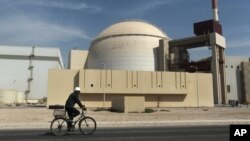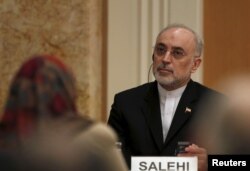Iran has informed the International Atomic Energy Agency it will resume testing of a new generation of nuclear centrifuges Wednesday.
Ali Akbar Salehi, the head of Iran's nuclear energy agency, said Tehran would remain within the framework of the Joint Comprehensive Plan of Action, or JCPOA, nuclear deal reached with the five permanent members of the United Nations plus Germany. Salehi added that the accord allowed Iran to test a new generation of nuclear centrifuges and that his country's nuclear program is intended for peaceful civilian purposes.
Salehi says Supreme Leader Ayatollah Ali Khamenei issued a religious edict years ago that banned nuclear weapons.
Khamenei told a group of visitors Monday that he had issued orders for the country's Atomic Energy Organization to increase its enrichment capacity to 190,000 centrifuges, provisionally, in accordance with the JCPOA.
President Donald Trump withdrew the United States from the 2015 nuclear accord last month. Britain, France and Germany have been attempting to salvage the deal that Trump has described as "horrible" and "one-sided."
Former Iranian President Abolhassan Bani Sadr told VOA he thinks Khamenei's decision to resume nuclear enrichment capacity is "not a well-thought out move," and that it is having negative consequences on regional interests.
According to Bani Sadr, the decision strengthens Israeli Prime Minister Benjamin Netanyahu's charge that Iran represents a threat to Israel and must evacuate its forces from Syria, as requested by the U.S.-Israeli-Saudi axis.
In addition, said Bani Sadr, Khamenei's statement that Israel will be "eradicated from the face of the Earth" negatively influences public opinion against Tehran.
Khattar Abou Diab, a political science professor at the University of Paris, tells VOA that Khamenei's decision was aimed at pressuring Europe into gaining concessions from the United States. While France's foreign minister spoke of "red lines" that Iran must not cross, Paris, Berlin and London have asked to be exempted from new economic sanctions Trump imposed on Iran.
Abou Diab argues that despite Iran's bluster, it "fears any eventual reaction or backlash from Washington."





